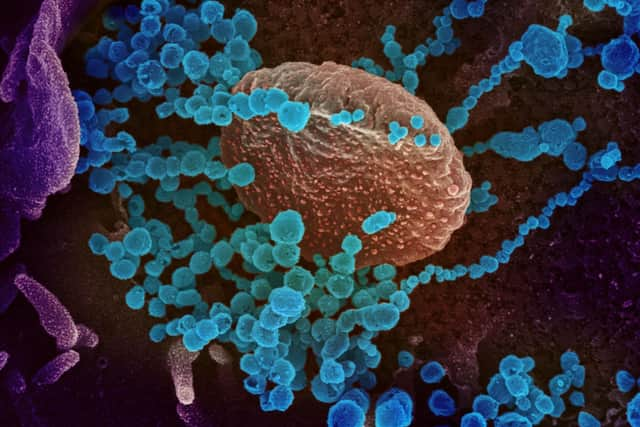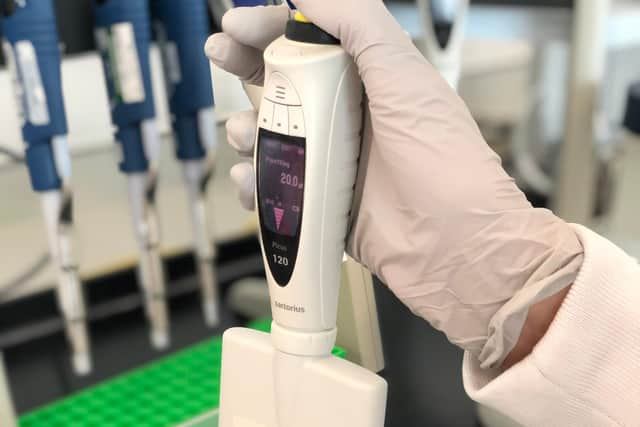Sewage under the microscope to create clearer picture of Scotland's Covid-19 infections
and live on Freeview channel 276
The study will look for fragments of non-infective Covid-19 ribonucleic acid (RNA) - a genetic footprint which can be measured in waste water even after the virus has been destroyed.
It’s hoped the findings will help highlight local spikes in the illness.
Advertisement
Hide AdAdvertisement
Hide AdSamples will be taken from waste water systems serving around half of the Scottish population and could, in combination with community testing and hospital admissions data, help reveal trends in the prevalence and distribution of the virus in Scotland.


If successful, the trial could form the basis of an ongoing monitoring programme that would provide additional information to back up the nation’s Test and Protect strategy in response to the pandemic.
The World Health Organisation has said there is currently no evidence that coronavirus has been transmitted via sewerage systems.
The research is being undertaken by the Scottish Environment Protection Agency (Sepa), the University of Edinburgh’s Roslin Institute and Scottish Water.
Advertisement
Hide AdAdvertisement
Hide AdDr Alexander Corbishley, of the Roslin Institute, said: “Detecting viral genetic material in waste water is relatively easy, however the challenge is measuring how much genetic material is present accurately and relating that to disease levels in the community.”


Terry A’Hearn, chief executive of Sepa, said: “We believe we are one of the first agencies in Europe to begin this work.
“Our hope is that our analysis could provide useful data in Scotland’s efforts to trace the virus.
“However, we first have to understand what the samples are telling us and that’s the important work our experts, alongside Health Protection Scotland, the Roslin Institute and others in the scientific community, are embarking on now.”
Advertisement
Hide AdAdvertisement
Hide AdThe first samples from eight health board areas are now being analysed in Sepa’s Lanarkshire Angus Smith laboratories, using the latest techniques trialled by the Roslin Institute and other leading academic institutions.
The trial has received funding from the state-backed Centre of Expertise for Waters (Crew).
Environment secretary Roseanna Cunningham said: “The Covid-19 pandemic has been an unprecedented global crisis which has fundamentally affected us all.
“There has of course been much research work carried out globally to better monitor, assess and understand the virus.
Advertisement
Hide AdAdvertisement
Hide Ad“Such work is crucial to ensure our recovery and I welcome this important project being undertaken by Sepa, Scottish Water, academia and other partners to monitor the prevalence of the virus across the Scottish population.”
A message from the Editor:
Thank you for reading this story on our website. While I have your attention, I also have an important request to make of you.
With the coronavirus lockdown having a major impact on many of our advertisers - and consequently the revenue we receive - we are more reliant than ever on you taking out a digital subscription.
Subscribe to scotsman.com and enjoy unlimited access to Scottish news and information online and on our app. With a digital subscription, you can read more than 5 articles, see fewer ads, enjoy faster load times, and get access to exclusive newsletters and content. Visit https://www.scotsman.com/subscriptions now to sign up.
Advertisement
Hide AdAdvertisement
Hide AdOur journalism costs money and we rely on advertising, print and digital revenues to help to support them. By supporting us, we are able to support you in providing trusted, fact-checked content for this website.
Joy Yates
Editorial Director
Comment Guidelines
National World encourages reader discussion on our stories. User feedback, insights and back-and-forth exchanges add a rich layer of context to reporting. Please review our Community Guidelines before commenting.